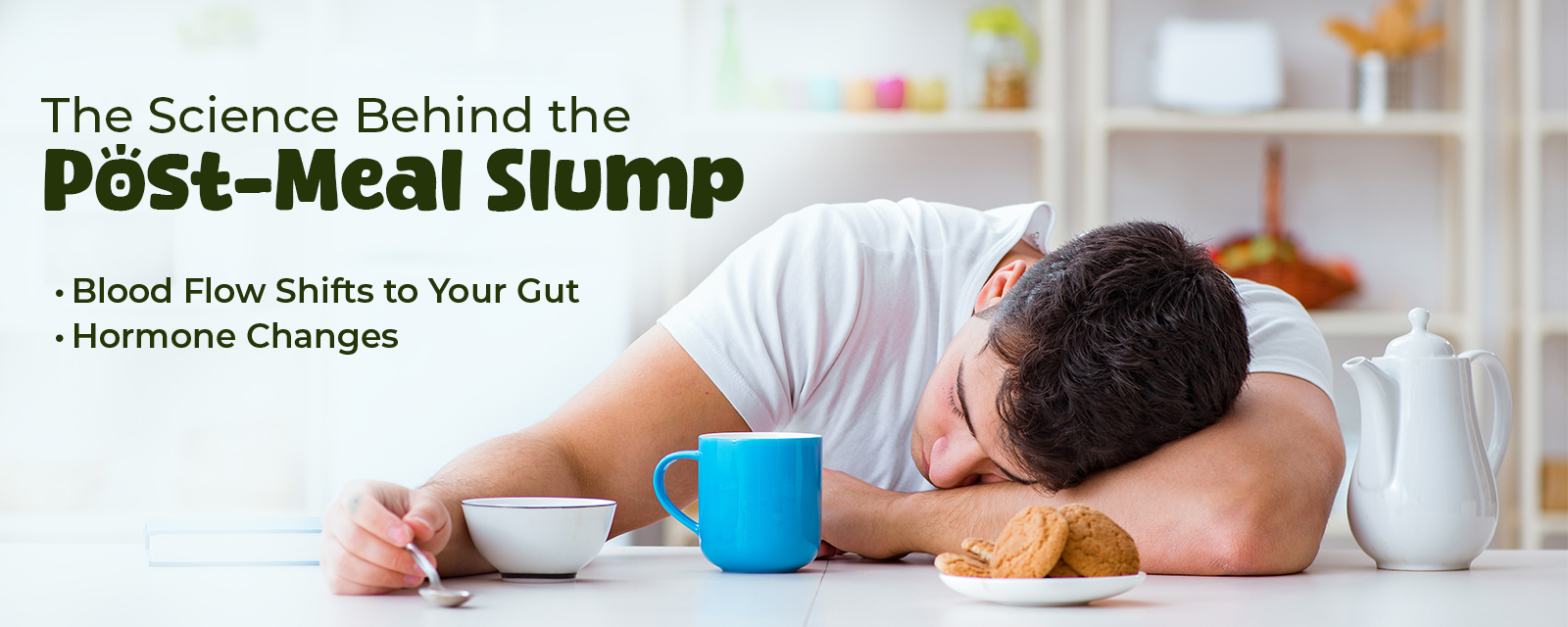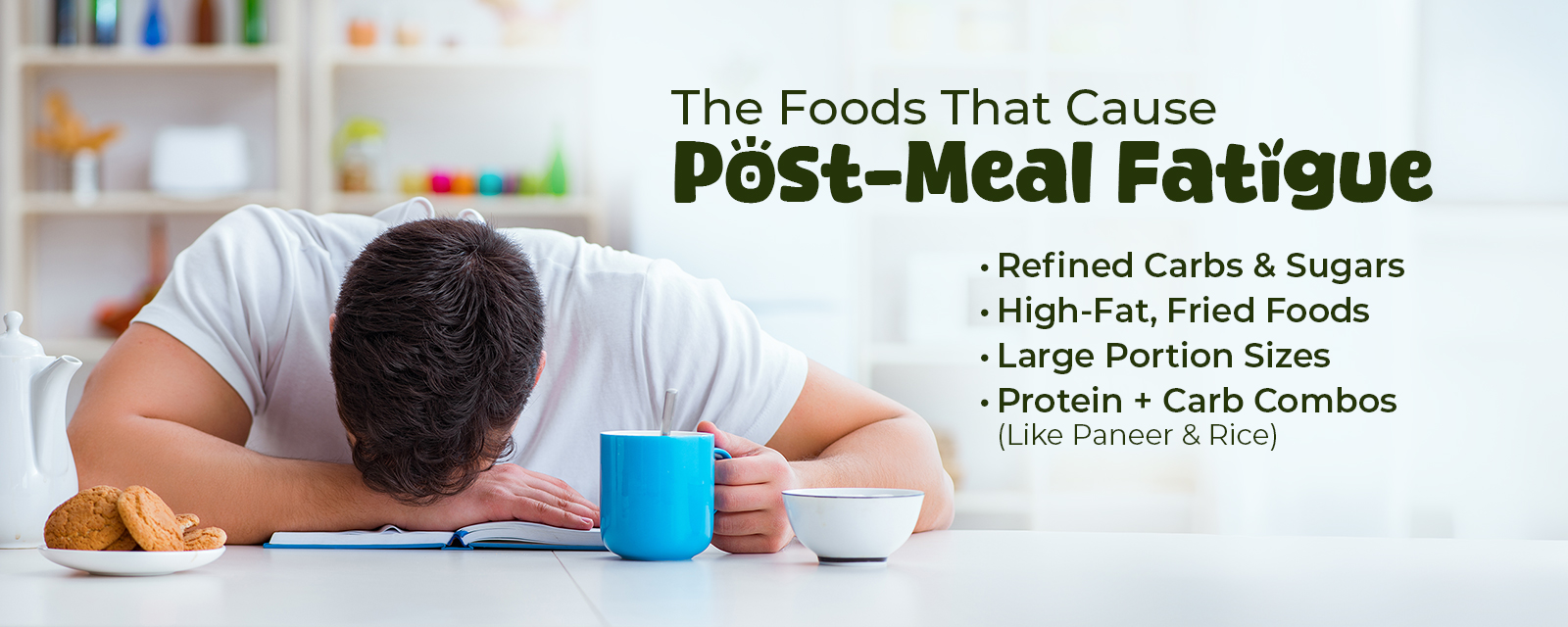
Have you felt yourself yawning uncontrollably after a heavy lunch or on your drive home after dinner with friends?
So, Is it normal to get sleepy after meals? Almost everyone feels the infamous “afternoon slump” or postprandial somnolence - commonly known as the “food coma.”
This is a real phenomenon when heavy foods make you sleepy after eating and our food choices have a major role to play.
The bad news? You can’t entirely avoid it. The good news? You can reduce its intensity with a few smart strategies.
In this blog, we tell you the real reason you feel post-meal fatigue and simple strategies with food and lifestyle to avoid it.
The Science Behind the Post-Meal Slump:
Your body is programmed to work with the circadian rhythm, an internal clock that governs your sleep-wake cycle with nature.
Feeling drowsy after eating can have different reasons including:

Blood Flow Shifts to Your Gut:
After eating, your blood flow redirects blood from other parts of the body - including the brain - to your stomach and intestines as the body prioritizes digestion.
In fact, up to 40% more blood flows to your digestive organs after a meal. This causes a reduction in mental alertness and physical energy.
Hormone Changes:
High-carb or heavy meals trigger your insulin spikes, boosting tryptophan in the brain - which increases the production of serotonin and melatonin, the chemicals that make you tired after eating.
These hormones put your body in a naturally restful and sedated state, especially after high glycemic index foods.
The Foods That Cause Post-Meal Fatigue:
Post-meal fatigue is not just about eating, it’s about what and how much you eat. Certain foods and eating habits are more likely to send into an after eating drowsiness.
Foods that make you tired:

Refined Carbs & Sugars:
Refined foods like white bread, pasta, pastries, sugary drinks, and desserts can cause your blood sugar to spike rapidly and then crash, leading to a sharp drop in energy.
A 2007 study in the American Journal of Clinical Nutrition found that high-glycemic meals increase drowsiness by 25% compared to low-GI meals.
High-Fat, Fried Foods:
High-on-fat and Fried foods like chicken, burgers, creamy pasta may taste great but cost you energy and leave you feeling drowsy after eating.
These foods take longer to digest which means your body spends more time and energy breaking them down.
This leads to your almost 40% of your blood being redirected to your gut, making you feel heavy and tired after eating.
Large Portion Sizes:
Even healthy foods can make you feel sluggish if you overeat. Eating large quantities of food stretches your stomach and increases your digestion time, amplifying the body’s natural “rest and digest” response.
Overeating can cause a 40% increase in post-meal fatigue, according to nutrition researchers.
Read More: The Power of Eating Portions: How to Eat Less and Live More
Protein + Carb Combos (Like Paneer & Rice):
A heart-healthy combination of protein and carbohydrates like paneer and white rice can increase the production of serotonin, a hormone that helps regulate mood and sleep.
Carbs also increase insulin, which remains in your bloodstream causing afternoon energy slump.
Foods to Avoid Post-Meal Fatigue:
There are certain foods you can avoid to enjoy your meals without crashing afterwards. It’s all about balance, portion control, and smart ingredient swaps.
Complex Carbs Over Simple Carbs:
Slow-digesting or complex carbohydrates can keep your blood sugar stable as they digest steadily, without spiking your glucose rapidly.
This includes brown rice, millets (ragi, jowar, bajra), dalia, quinoa, whole-grain bread and sweet potatoes.
Lean Proteins:
Lean proteins are high in protein but low in saturated fat. They're easier to digest, support muscle repair, and help maintain steady energy levels.
This includes moong dal, tofu, low-fat paneer, greek yogurt, and soya chunks.
Healthy Fats:
Healthy fats support an active brain function, hormonal balance and keeps you full without post-meal fatigue.
This includes nuts, seeds, avocado, olive oil, and desi ghee (in moderation)
Hydration:
Skip sugary and processed drinks and have plain water, lemon water or a warm herbal tea with your meals.
How to fight off sleepiness after eating?
Even if you make the right food choices, your body may still want to sleep. Here are some simple strategies to eat to avoid food coma:
Take a Short Walk:
A quick 10-minute walk after eating helps stimulate digestion and increases alertness.
Stay Hydrated:
Water supports digestion and circulation. Even mild dehydration can increase feelings of fatigue.
Avoid Heavy Meals Before Work or Driving:
Plan lighter meals before activities that require focus and concentration.
Eat Smaller, More Frequent Meals:
Instead of two or three big meals, try four to five smaller meals throughout the day to keep energy stable.
Use Caffeine Strategically:
If you drink coffee or tea, do so mid-morning or right after lunch to fight off natural dips in energy - but avoid caffeine too late in the day, as it may affect nighttime sleep.
Final Thoughts
Feeling sleepy after eating is completely normal and not a flaw you should be worried about.
Choose meals that balance protein, fiber, and complex carbs while skipping sugary ad processed foods.
Watch your portions and move a little after meals, even a 10-minute walk can help activate the blood flow in your body. And most importantly - listen to your body.
Read More From Naturopedia
10 Foods to Lower Your Blood Sugar
Why You Feel Bloated and Exhausted Even After Eating Healthy Foods
February 5th, 2026